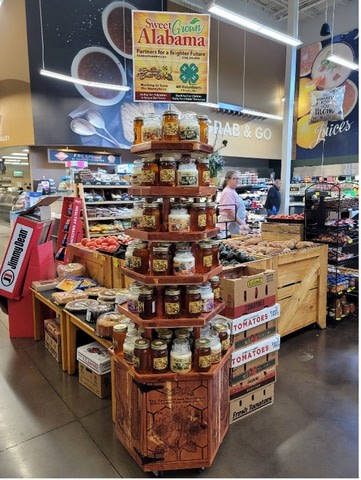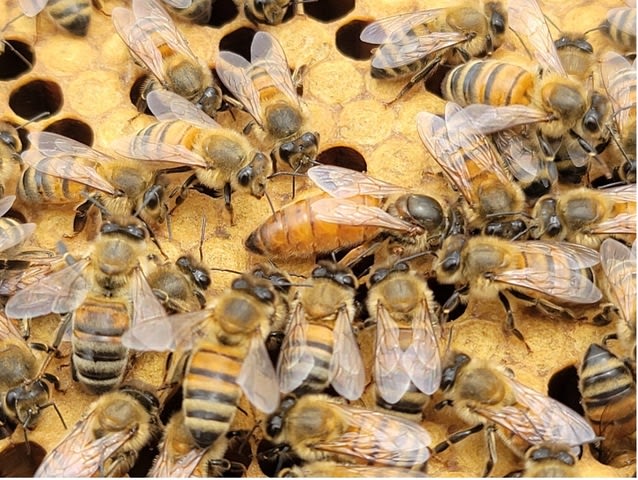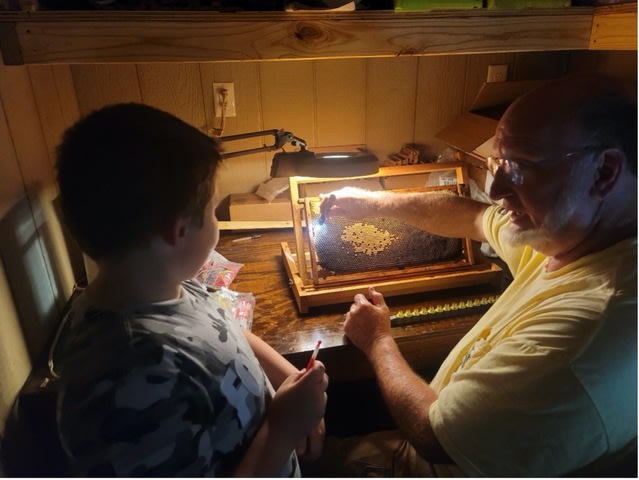
Beekeepers Join Forces to Craft Something Sweet
by Dr. Meredith Casey
July 10, 2023
Sweet Grown Alabama members Mike Keller of Southern Sweet Bee and Richard Woodham of Richard's Honey Bee Queens and Hive Products have joined forces to craft something sweet as honey for Alabama’s honeybee industry.
Mike's fascination with bees began early in life. He recalls himself as a seven-year-old intrigued by a beehive in an oak tree outside his church. Mike and several other children looked on as a man dressed in makeshift protective gear and with the help of a large pot, newspaper and a lighter safely harvested the honeycomb and shared it with Mike and the group. After being hooked, he used every book report and trip to the library to learn more about bees. In 1981 at the age of 13, he built his first beehive in a junior high school industrial arts class. The next spring, he bought his first package of bees.
As a freshman in high school, he accepted his first job as a beekeeper in Montgomery County. The company not only produced tons of honey but also produced thousands of queens annually and sold truckloads of caged colonies across North America. He learned a host of beekeeping skills while in this job. By the time he left for the army in 1986, he created and managed 75 beehives of his own.
The original label, Queen Royal Honey, was changed to Southern Sweet Bee, a name he developed with the help of his children, in 2012. After a successful career in manufacturing, he transitioned to beekeeping full-time in March 2018. Mike maintains a full line of honey and naturally scented candles that he ships nationwide. In addition to honey production, he also offers a pro bono bee swarm removal service. He collects local swarms free of charge or directs phone inquiries to other beekeepers closer to the swarm’s location.

Keller retails his Southern Sweet Bee honey and candles at multiple retailers across the state –
photo by Mike Keller.
Richard Woodham found his passion for bees later in life, rather by accident. A friend from his local shooting club introduced the idea of a new hobby—beekeeping. After the friend’s beekeeping endeavors ended, Richard inherited all the equipment necessary to start his own hives. He began with three hives ten years ago and has since expanded his number of hives and acreage.
“I asked myself, ‘Why do you want to do this?’, and my answer is that I wanted to give parents and grandparents something to do with their children and grandchildren," Woodham said. "I wanted it to build family and relationships and to be good for the environment.”
Mike and Richard met at an Alabama Farmers Federation leadership meeting for beekeepers from across the state, and the two became fast friends over their hobby. Their shared vision to see Alabama’s honeybee industry grow has directed their efforts to queen rearing, more commonly known as grafting.
“We’re both working on making the best queens possible,” Keller said.

A honeybee queen (center) surrounded by female worker bees – photo by Mike Keller.
The first step of rearing queens starts with observing colonies’ tendencies, or the way they behave. An ideal colony to use for grafting will bring in an abundance of pollen, produce plenty of honey and be free of disease.
“Grafting is all about selecting the behaviors and tendencies you want to duplicate,” Woodham said. “That’s how we get the very best honeybees we possibly can.”
When observing a colony’s tendencies, the health of drones, or male bees, is just as important as female worker bees and even the egg-laying queen herself. Richard, a Master Queen and Drone Breeder, traveled to Kentucky State University this summer to gain the highest level of education regarding grafting queens that includes artificial insemination. This technology will allow the team to introduce exceptional honeybee genetics from around the country to their colonies in central and south Alabama.
The duo agrees the future of beekeeping in Alabama is buzzing with potential. Working closely with industry groups, Richard is currently spearheading efforts to develop a check-off system for bee and honey products that will further research pertinent to the industry. He's also advocating for more research that quantifies the economic impact of beekeeping in the state of Alabama.
Both Mike and Richard actively spread their passion for bees by bringing others into the fold. As a full-time beekeeper who discovered his passion at a young age, Mike stresses the importance of introducing beekeeping to young children. As a result, he has served as a 4-H leader in Montgomery County where he has educated children, including the Boy Scouts, about bees. Mike is optimistic that his shared knowledge and expertise will one day inspire these children to own beehives or even become professional beekeepers themselves. He also hopes that his teachings and dedication will encourage others to make a difference in the beekeeping industry. Richard teaches seasonal beekeeping classes at Enterprise State Community College in addition to events with the Alabama Cooperative Extension System and the Alabama Master Beekeeper’s Association.

Keller’s grandson, Oliver, receives a lesson in grafting honeybee queens from Woodham – photo by Mike Keller.
For those wanting to start their beekeeping journeys, Richard's advice is twofold. First, he encourages newcomers to find a mentor that will let them suit up and gain experience interacting with bees. Second, he encourages new beekeepers to explore plenty of resources available on keeping bees.
Visit Sweet Grown Alabama.org to find local honey and beekeepers in your area.
